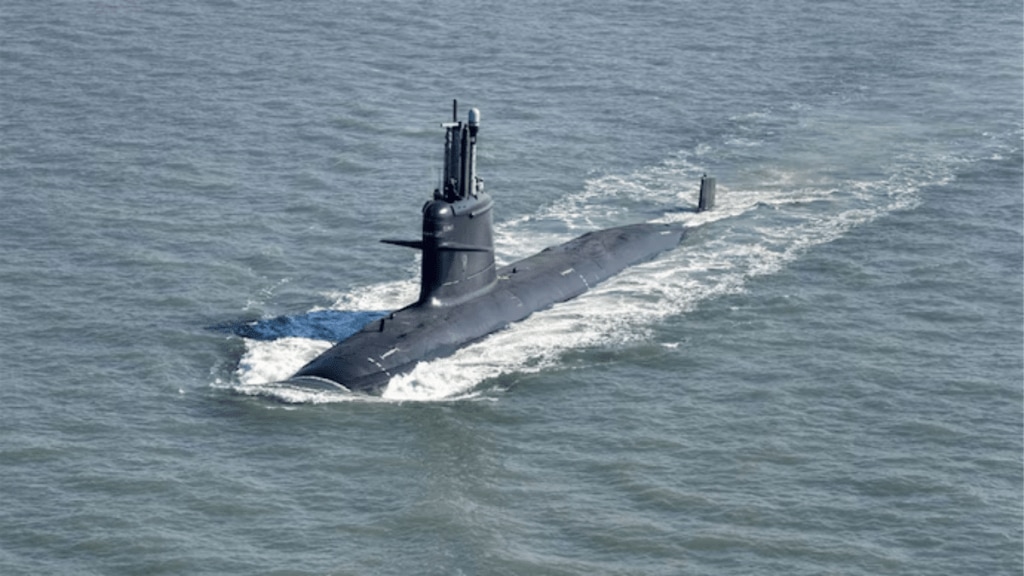In the high-stakes competition for India’s Project-75I submarine contract, German submarine manufacturer Thyssenkrupp Marine Systems (tKMS) has officially entered the race, thanks to substantial backing from the German government. This Rs 43,000 crore project, which involves the construction of six conventional submarines, aims to enhance the Indian Navy’s underwater capabilities. The final contract is anticipated to be signed before the end of the year.
Initially, tKMS was hesitant to participate due to the “terms and conditions” outlined in the Request for Proposal (RfP). However, the decision to enter the fray was confirmed by Khalil Rahman, the company’s India head, during a media interaction in New Delhi. Rahman cited the strong support from the German government as a key factor in overcoming the initial reservations.
Strategic Shift Post-Ukraine Invasion
Rahman explained that the German government has historically seen India as a significant market and partner. The invasion of Ukraine marked a turning point, prompting a strategic shift in Germany’s approach. This new perspective emphasized the necessity of deepening partnerships with India, particularly in the defense sector.
Advanced AIP Technology
A pivotal aspect of tKMS’s bid is its advanced Air Independent Propulsion (AIP) technology. The company successfully demonstrated the AIP capability on their Type 212 submarine during recent evaluations by the Indian Navy. Rahman expressed confidence in their technical position, highlighting that tKMS has proposed a customized version of its Type 214 submarine to meet the specific requirements of the Indian Navy. “Technically we are in a very strong position. The Indian Navy is very happy with the Type 209s in service. We have a sea-proven AIP,” Rahman noted.
Field Evaluation Trials and Government Support
The long-delayed Project-75I has seen significant progress with the completion of Field Evaluation Trials (FET) to assess the compliance of the bids received. The German government’s backing for tKMS has been crucial in resolving the initial concerns regarding the commercial terms of the RfP. “We initially made the decision not to bid due to terms and conditions in the RfP. The company felt there was too much risk in the commercial terms. These issues have now been resolved. One of the reasons is the support of the German government,” Rahman explained in response to a question.
The Role of AIP Technology
AIP technology, which allows conventional submarines to remain submerged for extended periods, was a central focus of the FET. This technology acts as a force multiplier, enhancing the endurance and stealth of submarines. The German company has a proven track record, having built 175 submarines since World War II, with 52 AIP-equipped submarines either operating globally or contracted. Rahman stated that the AIP module offered by tKMS would be both fuel cell- and lithium-ion-based, providing enhanced performance. “Fuel cell gives long-range endurance at low speed, while lithium-ion functions at high speed,” he said.
Indigenous Content and Delivery Schedule
The RfP mandates that the first submarine should have an indigenous content (IC) of 45 percent, increasing to 65 percent for the sixth and final submarine. The first submarine is expected to be delivered 84 months, or seven years, from the signing of the contract, with subsequent submarines being delivered annually.
Transfer of Technology
Rahman emphasized that the design of the submarine would be handed over to the Naval Design Bureau, with specific technologies being transferred as outlined in the RfP. “What India is getting is not off the shelf. These will be customized as per the Indian Navy’s specifications,” he added.
Competition from Navantia
TKMS faces competition from Navantia of Spain, which has teamed up with Larsen & Toubro (L&T). An Indian Navy team visited the tKMS shipyard in March for the FET, while the evaluation of Navantia’s offer was conducted in late June. Navantia has proposed a submarine based on its new S80 class, the first of which was launched in 2021 and commissioned into the Spanish Navy as S-81 Isaac Peral last November. L&T will be responsible for constructing these submarines.
Upcoming High-Level Talks
The submarine deal is expected to be a key topic during upcoming high-level talks with both Germany and Spain. German Chancellor Olaf Scholz is scheduled to visit India in the second half of October for intergovernmental consultations, while Prime Minister Narendra Modi is likely to visit Spain in the coming months.
Deepening Indo-German Defence Cooperation
The entry of tKMS into Project-75I, with robust support from the German government, signifies a deepening of Indo-German defence cooperation. This project not only aims to bolster the Indian Navy’s capabilities but also represents a significant step in fostering strategic partnerships between India and Germany. The successful execution of Project-75I will be a testament to the collaborative efforts and technological advancements achieved by both nations, marking a new chapter in their defence relationship.
As the competition heats up, the decision on Project-75I will be closely watched, with significant implications for the future of India’s naval defence capabilities and its international partnerships.

